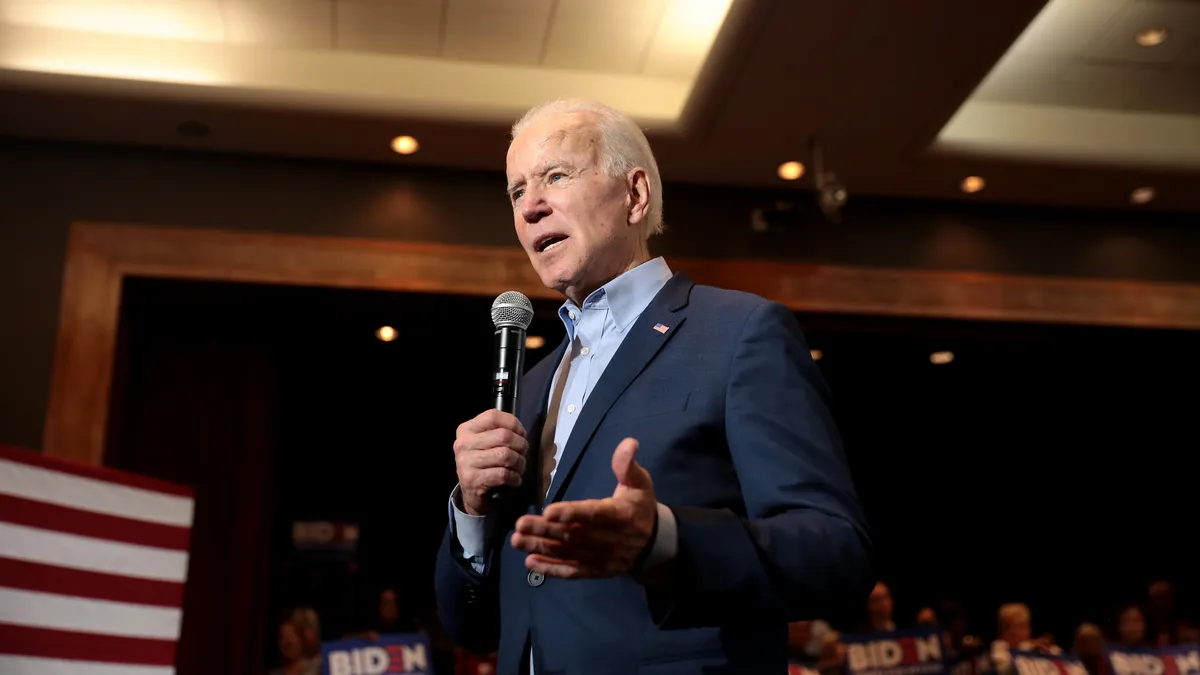Dive Brief:
-
Senate Democrats on Tuesday released a report laying out policy recommendations Congress should adopt in order to bring the U.S. to a net-zero carbon economy by 2050.
-
The report, released by the Senate Democrats' Special Committee on the Climate Crisis, calls on Congress to spend at least 2% of annual U.S. gross domestic product (GDP) on climate actions, with 40% of those investment benefits going toward communities of color or underprivileged communities, and require federal financial regulators to ensure publicly-traded companies disclose climate risks, among other measures. It also leaves the door open for a number of zero-carbon technologies, including nuclear and carbon capture.
-
The Democrats' report could have major implications for how climate and energy policy moves forward if Democratic Presidential nominee Joe Biden wins the election in November and Democrats manage to flip the Senate blue, said Narayan Subramanian, a fellow at research group Data for Progress. "Climate policy under a new administration is going to be defined by the Senate almost entirely," he said.
Dive Insight:
Biden's climate plan calls for spending $2 trillion over four years on clean energy investments and electrification, a plan praised by progressive Democrats and climate activists. But Senate Democrats' Tuesday report paints the most likely path forward for climate and clean energy policy under a Democrat-controlled federal government, because even if Democrats gain a majority in the Senate, that chamber will still be the most difficult place to get something passed, said Subramanian.
“We're not gonna have as hard of a time getting a climate bill passed through the House. It's really a question of what happens in the Senate,” he said. The Democrat-majority House in July passed the Moving Forward Act, a comprehensive legislative package that includes heavy investments in transportation and power sector decarbonization, as well as green infrastructure. Meanwhile, a bipartisan Senate bill on clean energy stalled in March over an amendment dispute, though Senate Energy and Natural Resources Committee Chair Lisa Murkowski, R-Alaska, has indicated she hopes to see it back on the floor this year.
Traditionally, the Senate is seen as the more conservative chamber, said Subramanian, and even under a Democratic majority, senators will have to appeal to a broader base in order to get the votes necessary to pass legislation.
“They're going to have to contend with the fact that they still have to cater to the interests of states like West Virginia, Montana, and many other states that still have somewhat of a stake in the fossil fuel economy,” he said. “That's why we should be keenly looking at the Senate Democratic proposal.”
Democrats' plan draws in financial provisions in more detail than any other Capitol Hill plan has thus far, said Steven Rothstein, founding managing director of the Ceres Accelerator for Sustainable Capital Markets. It calls for the Federal Reserve, the Securities and Exchange Commission (SEC) and other federal agencies to take into account climate change risks when assessing the impacts of climate to the financial sector, and calls on the SEC in particular to mandate public companies to include climate risks in their financial disclosures, something Sen. Elizabeth Warren, D-Mass., had included in her climate plan when she was vying to be the 2020 Democratic presidential nominee.
“When you look around the world [at] countries that are leading on addressing climate risks, one of the things that they all have in common is that their financial regulators, their central bankers, their other prudential regulators are looking at climate risk as part of their portfolio,” said Rothstein. “Europe, Asia, Latin America, many other places. In the United States, that's not the case.”
Other provisions in the plan include a strong focus on environmental justice — something spearheaded by the Green New Deal that has become mainstream climate policy at this point, said Subramanian.
"That really is the thrust and the essence of the Green New Deal, right? That climate policy isn't just simply emissions reduction policy. Climate policy is also labor policy, social policy and all the like," he said.
The report broadly seems to outline a coherent policy platform for the Democrats, with an emphasis on carbon reduction performance standards in each sector that leave the door open for innovation, said Ryan Fitzpatrick, director of the Climate and Energy Program at Third Way.
The plan "shows commitment to getting to an end goal," he said. "When you have these standards you have a concrete backing."













